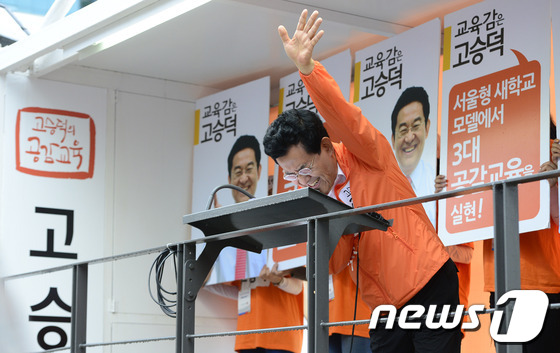by STEVE HAN
No one saw it coming. South Korean attorney and TV personality Koh Seung-duk was entering the June 4 local elections as the heavy favorite for Seoul’s superintendent of education, well ahead of his two rivals in polls. That’s until his 27-year-old daughter Candy Koh, who lives in New York, posted a dramatic appeal on her Facebook page to the citizens of Seoul—urging them not to vote for her father.
In her Facebook post on May 31, Candy described her father as a man who never “acknowledged his children’s experience [let alone] supporting their pursuit of education.” The superintendent of education is deemed a powerful post in South Korea, a nation that’s obsessed with education, and Koh’s daughter explained that a father who disregards his own family should not be given the power to be in charge of overseeing the education of children in the South Korean capital.
“I am not a citizen of your city, but I write you today out of urgency and dire concern for the future of your city’s education system,” the Facebook post read. “When his candidacy came to my attention recently, I could not, in good conscience, stay silent as his child. Seoul’s citizens deserve to know the truth about the person they may be choosing.
“I have next to no memories of his being present to teach me or my brother anything, even when I was old enough to have such memories. When my mother brought me and my brother to the U.S. to send us to a school in New York, Koh [Seung-duk] stayed in Korea and also decided to stop contacting us altogether.”
With only a few days to go before the election, the post went viral in South Korea and sparked scathing criticism of Koh Seung-duk. In response, the candidate, who divorced Candy’s mother in 2002, held a press conference soon after and accused one of his opponents, fellow conservative Moon Yong-rin, of using his daughter as a political tool to hurt his campaign. He also suggested that he was a humble man who had suffered “consequences” from being the son-in-law to Candy’s powerful maternal grandfather, Park Tae-joon, a founder of Korean steel giant POSCO, according to the Korea Joongang Daily.
“I am having suspicions that my daughter’s post was made out of collusion between the late Park Tae-joon’s son and Moon’s campaign team,” said Koh, during the press conference.
He rejected his daughter’s accusation that he never contacted his family, saying he would meet his children during their visits to Korea and talked on the phone or by text messages. “It may be possible that she didn’t feel it was quite enough [from me as a father],” he said.
When criticism from the Korean public didn’t stop, Koh offered a dramatic public apology. During a speech on the busy streets of Seoul, he screamed a high-pitched “I’m sorry!” and raised his hand. The image of his apology quickly became a meme, as his photo was Photoshopped to depict him as a rockstar and comic book superheroes.
“It had come down to the last few hours of campaigning for him to say an apology to me, but it’s just really bad acting,” Candy Koh told Al Jazeera.
In the end, the victory went to progressive candidate, Cho Hee-yeon, a little known sociology professor who beat both Koh, who had been popular even among liberals prior to the Facebook controversy, and Moon.
Notably, Cho was one of 14 liberal candidates—out of a total of 17 candidates—who won their races for local education chief seats this week, marking a major shift politically from the 2010 election, when liberal won only six posts, according to the Wall Street Journal. The newspaper reported that some are attributing the shift to voters’ desire for a change from the status quo, and particularly, greater concern for children’s safety and overall welfare in the wake of the Sewol ferry tragedy. President Park Geun-hye is from the nation’s conservative party.







